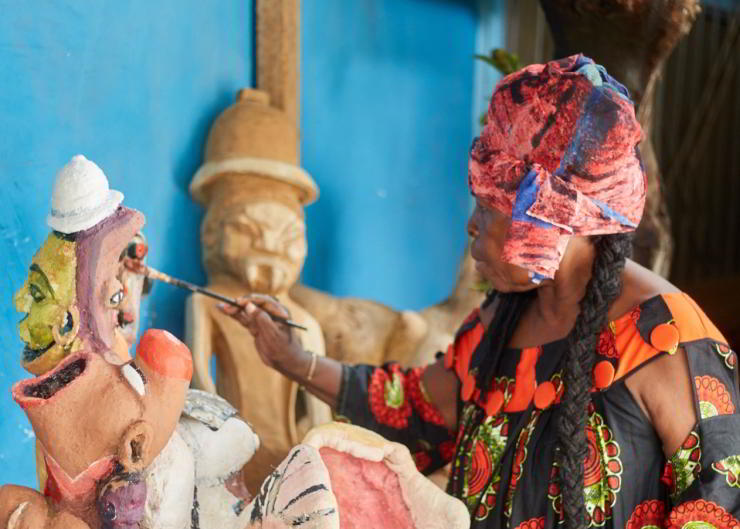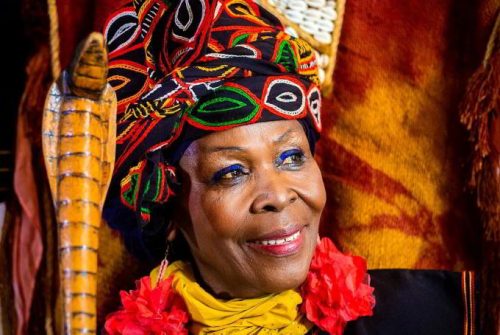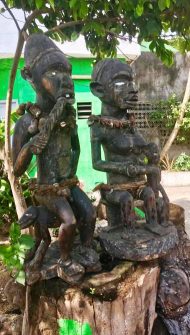African Art. Werewere Liking. The Artist of Memory.

As well as training young talent, she lives his art as a form of reclaiming African cultural traditions, challenging colonial narratives and celebrating the richness of diversity.
If there is anyone who today represents African art and its soul in its many facets and expressive capabilities, it is Wetewete Liking. A stage name that corresponds to Eddy-Njock N. Wetewete-Liking, born in Cameroon in 1950 and resident in Ivory Coast since 1978.
A multifaceted artist and an eclectic personality who expresses herself in the most diverse forms of art: literature, poetry, painting, dance, singing, theatre.The Venice Biennale and the Dakar Biennale were just some of the spaces where her works were exhibited, where it was possible to observe her vibrant, dense language of great value. One of the most prolific and significant African, or rather Pan-African women, Werewere Liking has dedicated her life path to expression.

Werewere Liking. CC BY-SA 4.0/Durand ndri
And she continues today, doing concrete things: bringing together artists, organizing exhibitions, happenings, and meeting places.
She started in 1997 at the Ki-Yi M’Bock Centre, which means “knowledge that surpasses all knowledge” in the Low language of her people. A place that creates events, and performances, and hosts and promotes artists, but it has also saved several young people from the streets, giving them another chance in life and transforming them into successful artists. It has been defined as a true “school of life”.
A philanthropy that is not an end in itself, but that aims at collective growth, construction and the search for meaning. This is why memory is so important to her, especially when exercised through women’s paths, their roles, and their silences. They are silences that she has filled with her intense experience of life and of being an artist.
In recent years she has worked and trained many artists and students at the University of Abidjan – where she works as a researcher – in the recovery of African cultural traditions, also but not only, as a form of liberation from colonial subjugation.

Representation of the ancestors at the entrance to the village Kiyi. Facebook
Liking’s work, which intersects and merges with social action, is a large archive that has continued to grow over the years, based on the revival of traditions, from masks to colours, from spirituality to ancestral elements, to the telling of stories from the continent. And which also includes the transposition of myths and legends, not only African. Like that of Medea with Médée. Les risques d’une réputation. Poems, novels, dramaturgical texts, paintings, sculptures, and theatrical productions; challenge colonial narratives and celebrate the richness of cultural diversity. And there is room for criticism, a semi-fantastic reading of the news of our days. Liking’s works, despite their drama and emotional strength, remain works that leave room for breath, hope, and optimism.
The work of this artist without borders has a clear function: to support social change and empowerment, to inspire the public to embrace their heritage, and their own identity and to question dominant narratives. She has published dozens of works of various genres. Many have been translated and staged or published abroad. Numerous awards, including the Noma 2005 for the novel La mémoire amputée. An artist, a woman who continues to be “avant-garde”. This year, on May 1st, she will turn 75. She sums herself up like this: Love, Art, Africa. An alphabet of only ‘As’ that manages to gather what this Artist brings in a baggage of knowledge and expressiveness that succeeds in containing so much. (Photo: Werewere Liking (Credit: Fondation Panafricaine Ki-Yi M’Bock. CC BY-SA 4.0)
Antonella Sinopoli



